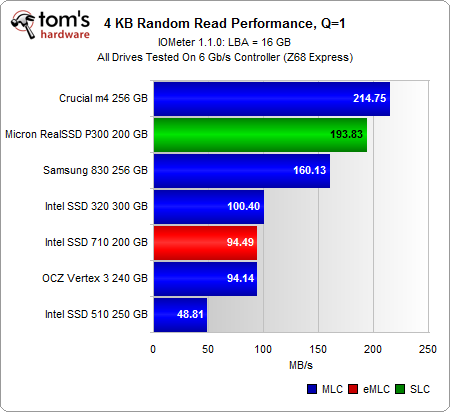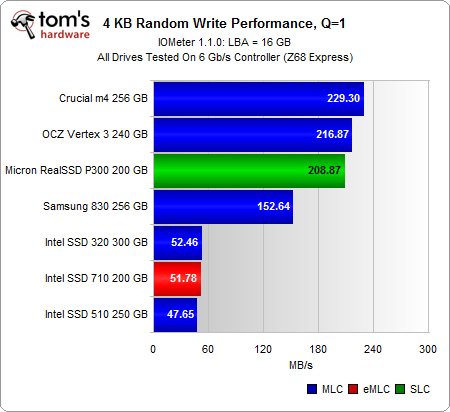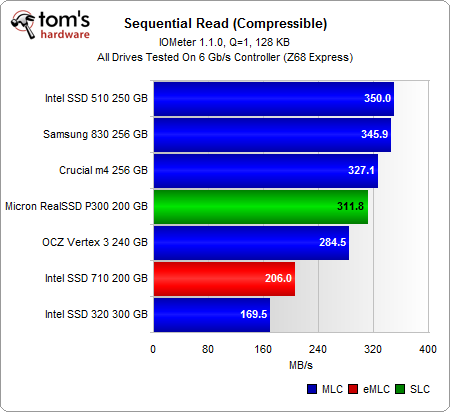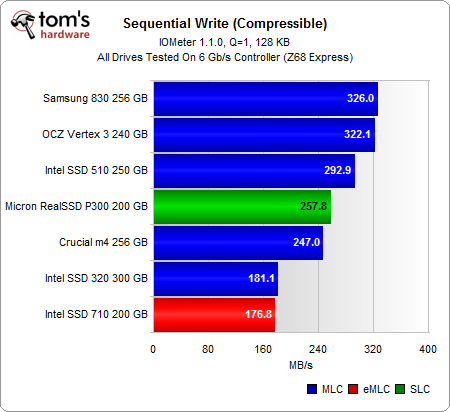Intel SSD 710 Tested: MLC NAND Flash Hits The Enterprise
Benchmark Results: 4 KB Random And 128 KB Sequential Performance
An overall metric is informational, but it doesn't give us enough data about a drive's specific performance characteristics. That's why it's still important to examine random reads, random writes, sequential reads, and sequential writes. If you're unfamiliar with those terms and what they represent, you can refer back to page three of SSD Performance In Crysis 2, World Of Warcraft, And Civilization V.
Even though the SSD 710 is an enterprise-class drive, suggesting that it's intended to handle intensive workloads where I/O operations stack up, we're starting our synthetic testing with a queue depth of one in order to compare baseline performance with other SSDs. We'll get to the enterprise workloads shortly.
The random read rate for the 710 is remarkably similar to the 320. But again, that's hardly a surprise.
The SSD 710 has a specified random write speed nearly 10x lower than the 320, but that only applies to the high queue depths where all SSD vendors benchmark their offerings, yielding the highest possible performance. When we scale back to a queue depth of one, the SSD 710 behaves a lot like Intel's SSD 320 yet again.
Intel's datasheet also suggests nearly identical sequential performance between the enterprise and client products. Again, though, this only applies to higher queue depths. With only one active I/O operation, the SSD 710 performs about 15% better in sequential reads, and similarly in sequential writes.
Compared to the P300, the SSD 710 offers ~50% slower performance for both sequential reads and writes. You have to ask yourself it the Micron drive is worth its price premium, though; at 200 GB, it sells online for a little less than $2000.
Get Tom's Hardware's best news and in-depth reviews, straight to your inbox.
Current page: Benchmark Results: 4 KB Random And 128 KB Sequential Performance
Prev Page Benchmark Results: Storage Bench v1.0 & PCMark 7 Next Page Benchmark Results: Enterprise Performance-
whysobluepandabear TLDR; Although expensive, the drives offer greater amounts of data transfer, reliability and expected life - however, they cost a f'ing arm and a leg (even for a corporation).Reply
Expect these to be the standard when they've dropped to 1/3rd their current price. -
RazorBurn To some companies or institutions.. The data this devices hold far outweighs the prices of this storage devices..Reply -
nekromobo I think the writer missed the whole point on this article.Reply
What happens when you RAID5 or RAID1 the SSD's??
I don't think any enterprise would trust a single SSD without RAID. -
halcyon __-_-_-__with the reliability those have they will never ever find their way into any serverMy Vertex 3 has been very reliable and I'm quite satisfied with the performance. However, I've heard reports that some, just like with anything else, haven't been so lucky.Reply -
toms my babys daddy I thought ssd drives were unreliable because they can die at any moment and lose your data, and now I see that they're used for servers as well? are they doing daily backups of their data or have I been lied to? ;(Reply -
halcyon toms my babys daddyI thought ssd drives were unreliable because they can die at any moment and lose your data, and now I see that they're used for servers as well? are they doing daily backups of their data or have I been lied to? ;(SSDs are generally accepted to be more reliable than HDDs...at least that's what I've been lead to believe.Reply -
Onus halcyonSSDs are generally accepted to be more reliable than HDDs...at least that's what I've been lead to believe.Yes, but when they die, that's it; you're done. You can at least send a mechanical HDD to Ontrack (or a competing data recovery service) with a GOOD chance of getting most or all of your data back; when a SSD bricks, what can be done?Reply
-
CaedenV nekromoboI think the writer missed the whole point on this article.What happens when you RAID5 or RAID1 the SSD's??I don't think any enterprise would trust a single SSD without RAID.The assumption is that ALL servers will have raid. The point of this article is how often will you have to replace the drives in your raid? All of that down time, and manpower has a price. If the old Intel SSDs were about as reliable as a traditional HDD, then that means that these new ones will last ~30x what a traidional drive does, while providing that glorious 0ms seek time, and high IO output.Reply
Less replacement, less down time, less $/GB, and a similar performance is a big win in my book.
toms my babys daddyI thought ssd drives were unreliable because they can die at any moment and lose your data, and now I see that they're used for servers as well? are they doing daily backups of their data or have I been lied to? ;(SSDs (at least on the enterprise level) are roughly equivalent to their mechanical brothers in failure rate. True, when the drive is done then the data is gone, but real data centers all use RAID, and backups for redundancy. Some go so far as to have all data being mirrored at 2 locations in real time, which is an extreme measure, but worth it when your data is so important.
Besides, when a data center has to do a physical recovery of a HDD then they have already failed. The down time it takes to physically recover is unacceptable in many data centers. Though at least it is still an option.



